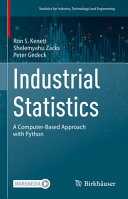Product desciption
Industrial Statistics A Computerbased Approach With Python Ron S Kenett by Ron S. Kenett, Shelemyahu Zacks, Peter Gedeck 9783031284816, 303128481X instant download after payment.
This innovative textbook presents material for a course on industrial statistics that incorporates Python as a pedagogical and practical resource. Drawing on many years of teaching and conducting research in various applied and industrial settings, the authors have carefully tailored the text to provide an ideal balance of theory and practical applications. Numerous examples and case studies are incorporated throughout, and comprehensive Python applications are illustrated in detail. A custom Python package is available for download, allowing students to reproduce these examples and explore others. The first chapters of the text focus on the basic tools and principles of process control, methods of statistical process control (SPC), and multivariate SPC. Next, the authors explore the design and analysis of experiments, quality control and the Quality by Design approach, computer experiments, and cybermanufacturing and digital twins. The text then goes on to cover reliability analysis, accelerated life testing, and Bayesian reliability estimation and prediction. A final chapter considers sampling techniques and measures of inspection effectiveness. Each chapter includes exercises, data sets, and applications to supplement learning. Industrial Statistics: A Computer-Based Approach with Python is intended for a one- or two-semester advanced undergraduate or graduate course. In addition, it can be used in focused workshops combining theory, applications, and Python implementations. Researchers, practitioners, and data scientists will also find it to be a useful resource with the numerous applications and case studies that are included. A second, closely related textbook is titled Modern Statistics: A Computer-Based Approach with Python. It covers topics such as probability models and distribution functions, statistical inference and bootstrapping, time series analysis and predictions, and supervised and unsupervised learning. These texts can be used independently or for consecutive courses. This book is part of an impressive and extensive write up enterprise (roughly 1,000 pages!) which led to two books published by Birkhäuser. This book is on Industrial Statistics, an area in which the authors are recognized as major experts. The book combines classical methods (never to be forgotten!) and “hot topics” like cyber manufacturing, digital twins, A/B testing and Bayesian reliability. It is written in a very accessible style, focusing not only on HOW the methods are used, but also on WHY. In particular, the use of Python, throughout the book is highly appreciated. Python is probably the most important programming language used in modern analytics. The authors are warmly thanked for providing such a state-of-the-art book. It provides a comprehensive illustration of methods and examples based on the authors longstanding experience, and accessible code for learning and reusing in classrooms and on-site applications Professor Fabrizio Ruggeri Research Director at the National Research Council, Italy President of the International Society for Business and Industrial Statistics (ISBIS) Editor-in-Chief of Applied Stochastic Models in Business and Industry (ASMBI)


